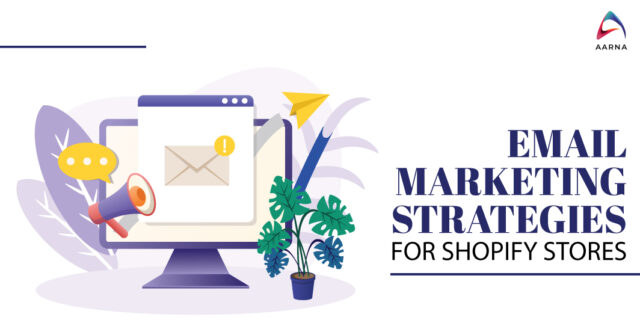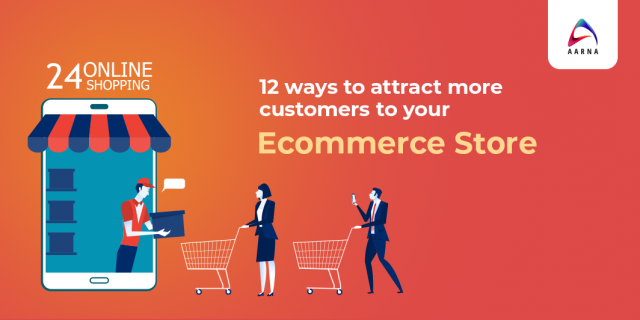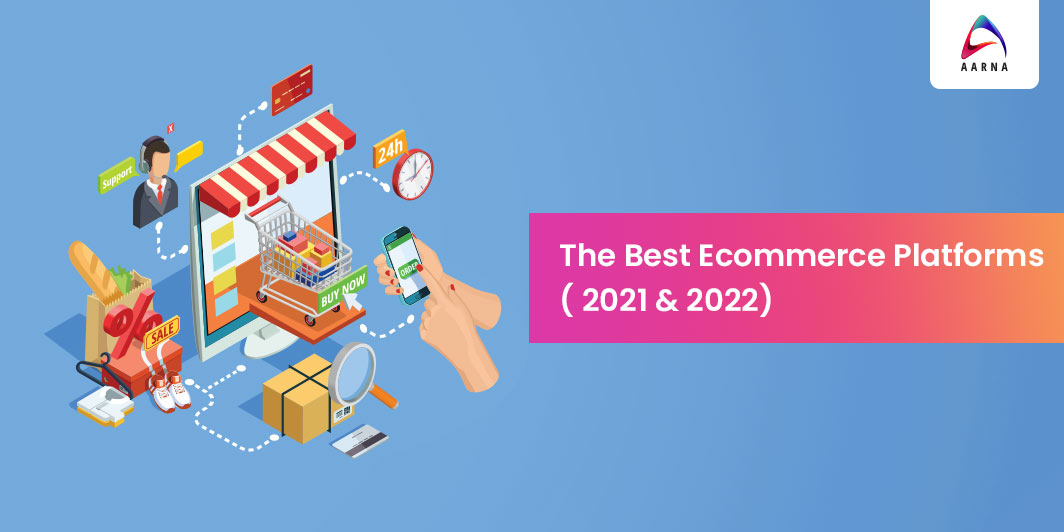
Ready to start selling online? You require an ecommerce platform.
An ecommerce platform is a website that allows companies to introduce, host, as well as take care of an online store. While different ecommerce systems provide different functions, all of them give company owner a way to offer directly to consumers. For anyone thinking about growing an internet ecommerce organization, this is an ideal time. On the internet, attention is at an all-time high. Individuals are familiar with the procedure of getting online, and over 69% of customers today have bought at the very least one product online.
Yet discovering the best ecommerce software program isn’t always easy. The market has ended up being flooded with numerous various ecommerce remedies of all types and dimensions. Thankfully, this large range of alternatives indicates that the perfect remedy for your specific scenario is out there. You simply require to search it. Whether you’re beginning a brand-new website from square one or looking to change service providers and hire ecommerce marketing experts, this guide by an ecommerce marketing agency in India, will certainly direct you in the appropriate direction.
The Best Ecommerce Platforms To KickStart Your Ecommerce Journey
1. Shopify
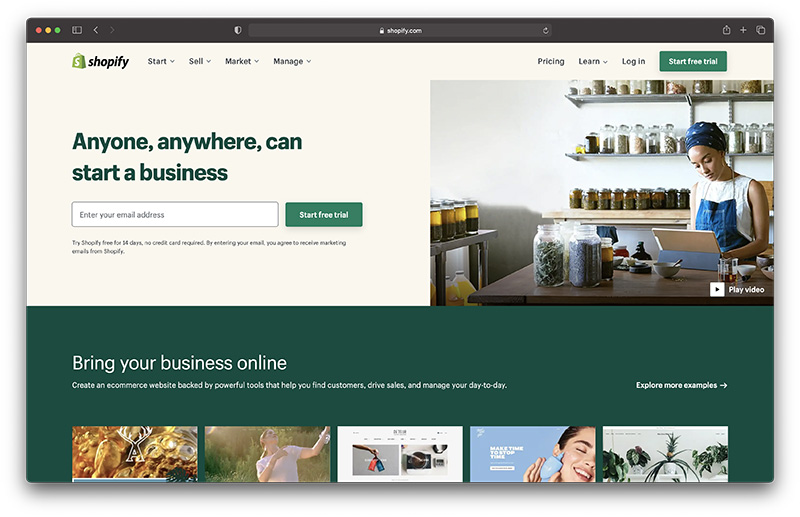
Pros: Easy/quick set-up, pricing strategies, quick downloading speeds
Cons: Weak SEO, deal costs (using non-Shopify repayments), pricey applications
Rate: $29 to $299 per month, Shopify Plus prices vary
Best for: Small to huge degree ecommerce
Shopify is probably the most widely known ecommerce platform on the planet. The power is greater than a million ecommerce websites throughout several industries and also item types. That’s because it’s both easy to use and configure, while likewise being unbelievably powerful. It’s a terrific choice for beginners or organizations without a lot of internal technology remedies. Shopify is additionally extremely flexible. It’s utilized by local businesses as well as larger-scale businesses alike. Stars like Kylie Jenner made use of Shopify to develop her billion-dollar realm selling lip packages from Kylie Cosmetics. Yet you could use it for a small startup also. Another stick out from Shopify is its award-winning 24/7 assistance, which you’ll have accessibility to even before you register for a Shopify plan. Most ecommerce marketing experts recommend Shopify to their clients.
2. WooCommerce
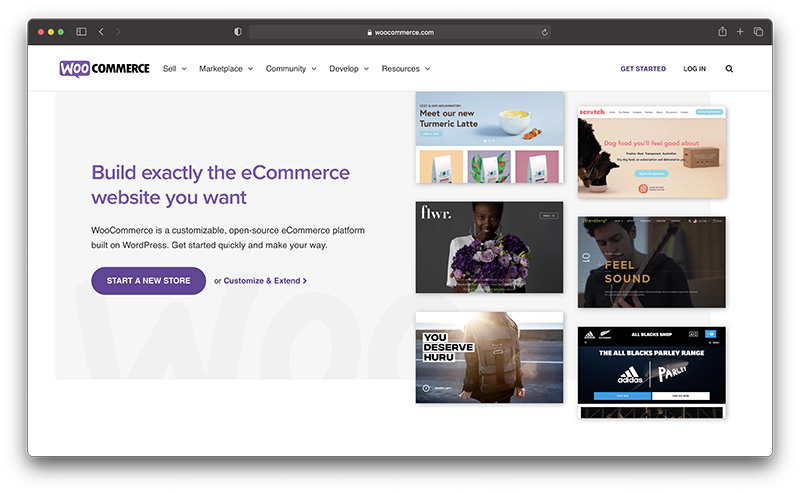
Pros: SEO Optimized, WordPress experts readily available, Highly Customizable, Free
Disadvantages: Requires expansions, Pay for Hosting, Poor Support, Scalability issues,
Rate: Free with WordPress Account, extra costs for holding and also plugins.
Best for: WordPress Sites, Small to medium dimension ecommerce
WooCommerce powers over 28% of all online stores and also is the ecommerce platform for the SEO king, WordPress. Popular amongst ecommerce web programmers, WooCommerce offers customers a solitary platform to run both their ecommerce as well as the associated site upon. It works as a WordPress plugin for your online sales. Making use of the power of WordPress, business owners can customize their ecommerce site with a selection of extensions, like 1-Click Selling and PayPal assimilation. These are outstanding for B2C ecommerce. The good news is that WooCommerce is complimentary for those who currently have a WordPress website. Nonetheless, keep in mind that hosting can set you back a pretty penny and some expansions aren’t free. As a starting ecommerce platform, WooCommerce is excellent for those currently knowledgeable about WordPress. If you recognize the WordPress website builder tools, and also you are looking to add ecommerce abilities, that is worth considering.
3. Magento
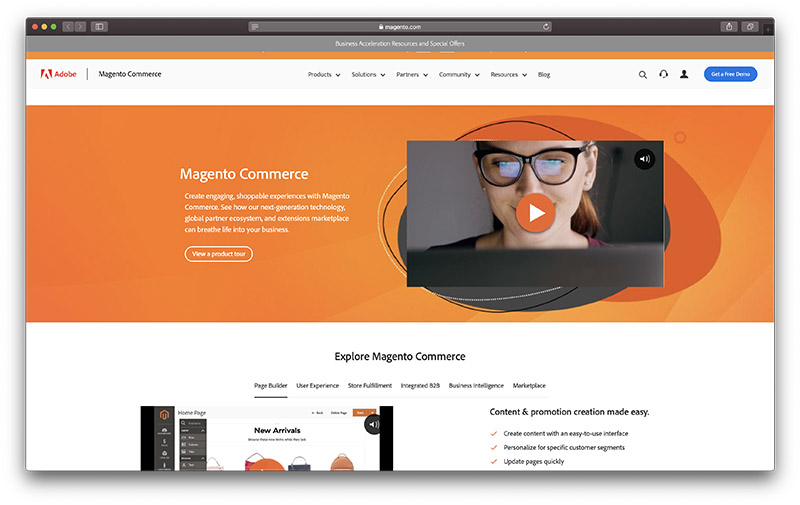
Pros: Highly Customizable, Strong SEO, Large Community of Support
Cons: Costly with Commerce Edition, Requires Experienced Developers
Price: Free, Magento Commerce/Cloud sets you back $24,000 and up (annually).
Best for: Enterprise-level Ecommerce, those with designer sources.
Magento is just one of the leading websites of ecommerce. It is made use of by well-known multinational businesses, including Nike, Coca-Cola, Samsung, Ford, and a lot more. In general, there are practically 250,000 active websites on this platform, 1.2% of all websites online. Adobe press, in a report, stated that Magento averages roughly $150 million in yearly profits. The approximately estimated market share is about $1.5 billion. As an open-source ecommerce platform, Magento is recognized for having a large neighbourhood of companions and also developers that offer assistance.
4. BigCommerce
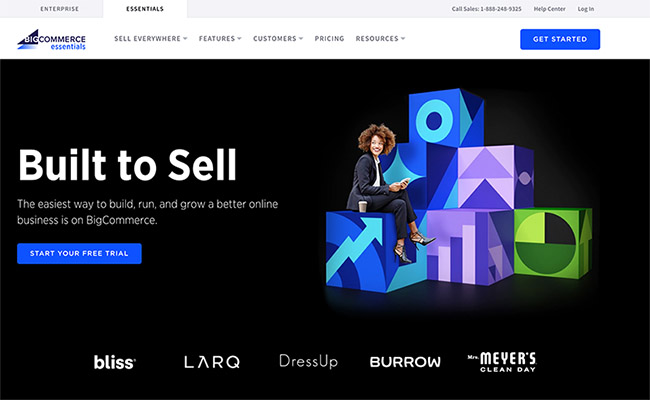
Pros: Strong SEO, Flexible, Scalable, Multi-Channel Selling.
Cons: Sales limits, No mobile app, Scalability, Prone to bugs.
Cost: $29 to $249 each month, Enterprise rates differs.
Best for: Beginner to advanced ecommerce.
BigCommerce is a durable all-in-one ecommerce platform providing whatever you need to market online. As a matter of fact, BigCommerce has more native functions than Shopify built-in right out of the package. It’s easy to be bewildered by its attributes– but for individuals who plan on making the most of these added functions, it’s good to recognize that you will not have to pay added for performances. BigCommerce makes it easy for you to take care of sales throughout multiple channels too. You’ll be able to offer to clients across systems like Amazon, eBay, Instagram, as well as Facebook. BigCommerce also companions with payment services like PayPal as well as Square to enable your consumers a lot more options to purchase your items.
5. OpenCart
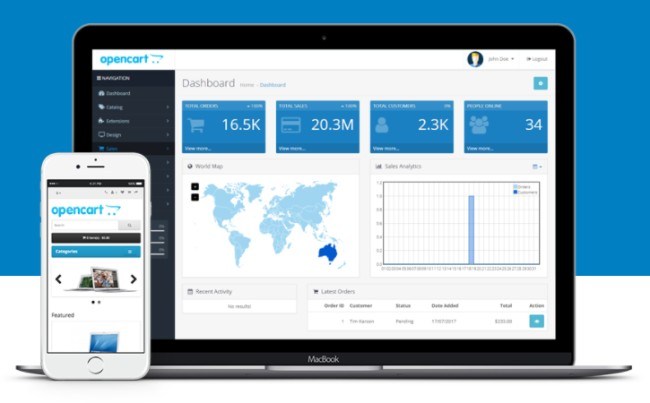
Pros: Free, Open-Source, Customizable, Ease of Use for Dev.
Cons: Low Support, Requires Developer, Add-ons Required.
Cost: Free, OpenCart Cloud rates vary.
Best for: Small to Mid-size ecommerce with web experience.
The OpenCart ecommerce platform supplies everything you require to create as well as manage your online store. More than 342,000 ecommerce websites around the world are powered by OpenCart. It is not a website building contractor. It’s an open-source software program that you can mount to include ecommerce capabilities to your existing website. Among the reasons customers like OpenCart is since the admin control panel makes it very easy for you to handle whatever making use of a single as well as straightforward interface. An additional major benefit of OpenCart is its market. It has more than 13,000 modules, themes, and extensions. So if you intend to incorporate something with your ecommerce store, there’s a good chance it’s available on the OpenCart marketplace.
6. Salesforce Commerce Cloud
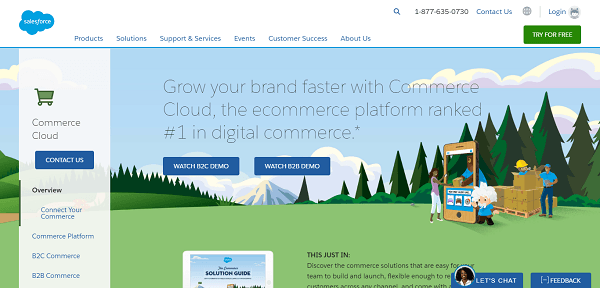
Pros: Scalability, Customizable (to an extent), Cloud Services.
Cons: Requires Developer, boost with quantity.
Cost: Varies, you can request a quote.
Best for: B2C Small to Large Ecommerce with little or no internet experience.
Salesforce Commerce Cloud, formerly known as Demandware, until being bought by Salesforce, uses a cloud-based SaaS ecommerce solution. A distinct function of Commerce Cloud is their AI system that can permit brands to supply a unique buying experience to consumers across every network, by giving brand names deep understandings into the behaviour of their consumers. Ecommerce website development and design do need understanding coding knowledge, however, Commerce Cloud supplies a considerable list of attributes and makes it very easy for scalability.
7. Wix

Pros: Easy to utilize, creative layouts, cost-effective.
Cons: Weak SEO, Lacks functions, Not suitable for a tool to big ecommerce.
Price: $17 to $25 each month.
Best for: Beginners, tiny ecommerce (less than 100 products).
Wix is a really flexible, drag-and-drop website builder. It can get used to any of your website development requirements. The very best part about using Wix as an ecommerce platform is its simplicity. Your ecommerce site will obtain the same drag-and-drop advantages as a standard Wix website. You just need to pick an ecommerce strategy to accept repayments online. For those of you that are currently utilizing Wix, you can constantly update your plan to activate the ecommerce capability. Your Wix shop manager makes it very easy to take care of stock, track orders, as well as communicate with your consumers. With its integrations with bookkeeping software applications like Quickbooks, Wix shines as an ecommerce website builder.
8. Squarespace

Pros: Easy configuration, Creative design template layouts, SEO, Affordable.
Cons: Lack of functions (no multi-channel selling, etc.), no phone assistance, absence of combinations (Limited PayPal, Amazon, and so on).
Price: $26 or $40 per month (paid yearly).
Best for: Beginners, Small ecommerce.
Squarespace is an additional popular website builder. However, Squarespace has a completely incorporated ecommerce platform built into every strategy besides the entry-level option. With Squarespace, developing an attractive website is easy. The layouts are modern-day and also completely adjustable. You can also mount several design templates to one website as well as buttons between them at any moment. We would certainly advise Squarespace to new ecommerce shops that are unclear of what the future holds. That’s because this platform makes it easy for you to scale or pivot the instructions of your sales approach.
9. Ecwid
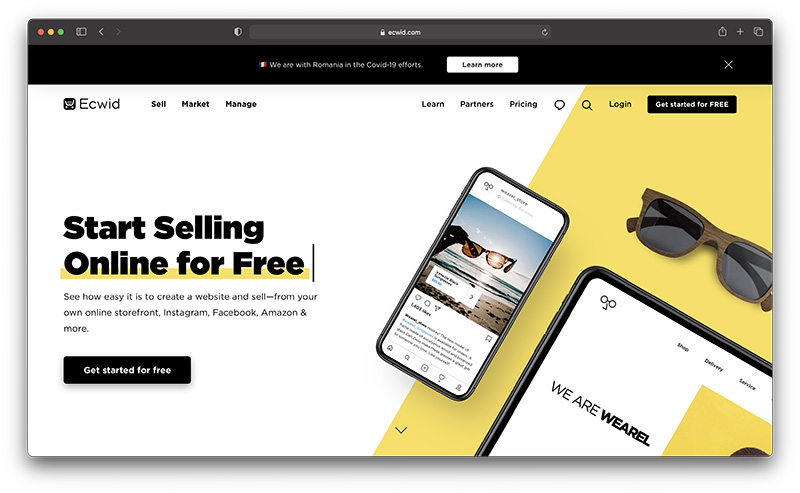
Pros: Implement shop on existing websites, Ease of use, Affordable, administration devices.
Cons: Limited variety of products for plans, Low SEO, Not complete ecommerce website.
Cost: Free to $99 each month.
Best for: Existing sites, Small ecommerce, non-ecommerce focused business.
Ecwid is an easy to use SaaS ecommerce platform, providin.g comparable features as various other SaaS options, however with a twist. A one-of-a-kind feature about Ecwid is that it can be applied on any kind of existing platform (WordPress, Joomla, etc.), without needing to make a new website. You can not develop a full ecommerce website with Ecwid, yet rather apply online store attributes on an existing website. They provide prices starting with a complimentary version as well as much as unlimited preparation for $99 per month. Just the leading two strategies have the deserted cart saver as well as just the unrestricted strategy enables an endless number of products.
Conclusion
There is no single overall “best” eCommerce platform. Every firm has its one-of-a-kind mix of requirements, budget, and also employees, determining which online shopping platforms function the most effective for them. Analyze your requirements thoroughly, and do not be scared to conduct a couple of trials to identify which option you choose the majority of. Do your due research, hire the most effective website development company in India, and you will surely have a website that will take your business to new heights.
